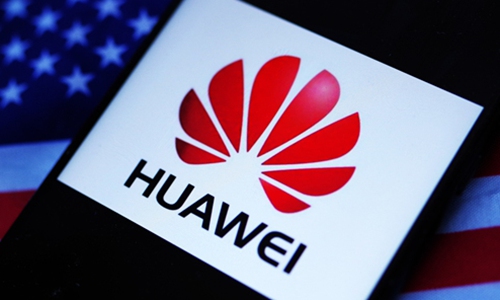US technological elites’ view on Huawei inconsistent, illogical

Photo:IC
Eric Schmidt, head of the Pentagon's Defense Innovation Board and former Google CEO, made some serious allegations about Chinese tech giant Huawei during his interview with BBC, published on Thursday. Yet his statements largely unveiled some US elites' seriously inconsistent and illogical views on the tech race between China and the US.
"There's no question that Huawei has engaged in some practices that are not acceptable regarding national security… information from Huawei routers has ultimately ended up in hands that would appear to be the state," Schmidt claimed, like other US politicians who are fond of hyping up conspiracy theories, did not provide any evidence.
It seems to be a common practice for quite a few US elites to fabricate accusations against China without proof. As a Chinese saying goes, they are judging the moral ones by evil standards. A meeting was held in January 2010 between then secretary of State Hillary Clinton and US internet companies' chief executives, including Schmidt, with the main topic being on how to use online tools to spread American-style democracy worldwide. Was it an indication that Google is a national security threat to many countries?
Schmidt denied that the Chinese model of state-directed investment in technology is more successful than a free-market model. Nevertheless, he urged the US government to invest more in research funding. He even published an article in February articulating "We can't win the technology wars without the federal government's help."
Government investment in technology is an important reason why US technological prowess has become what it is today, with its space program and internet all being initially funded by the US Department of Defense. Then why is China's state-directed investment in technology treated by the US as an original sin? Ironically, when Schmidt is calling for the US government's help in the high-tech sector, US politicians are attacking Huawei, a private company in China.
As some observers pointed out, Schmidt is now working for the US administration and he is relying on the US' position, nothing new. The stance he voiced, which represents the US administration, only clarified one thing - the US is fearful due to the rise of Chinese advanced technology, and it is muddled in coping with the trend.
The US is filled with vigilance against China since it has not been confronted by any real competition before of being surpassed in certain key technological sectors.
So it labels any leading Chinese tech enterprise, including Chinese manufacturer DJI, the global leader in civilian drones and Chinese short video platform TikTok, as "national security threats" in an attempt to suppress them. Is this how the world's No.1 superpower in technology is supposed to behave toward other foreign companies? If US national security has that many loopholes in which to be easily threatened, does US technology have any worth for other enterprises to "copy?"
Technology is the key to national strength and the commanding height of competition among major powers. Washington knows it yet it is on the wrong path. At least Schmidt has said one thing right - decoupling is not the option. The US needs to sort out a new way in dealing with the high-tech race with China.